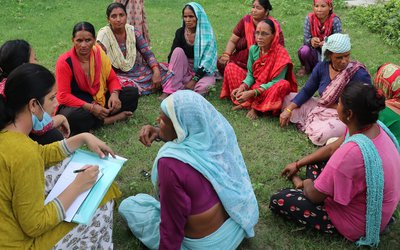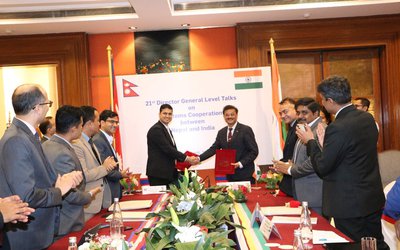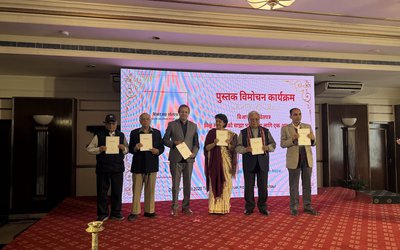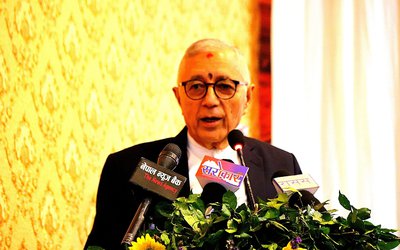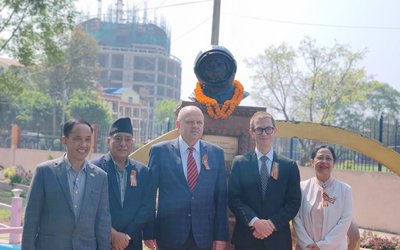The Illusion of Neutrality and the Shadow of International Fact-Checkers Day
Every year on April 2, the world observes International Fact-Checkers Day, established in 2017 by the International Fact-Checking Network (IFCN) to highlight the role of evidence-based journalism in combating misinformation. Yet, as Nepal grapples with viral hoaxes about constitutional amendments and monsoon disaster scams, this day also underscores a paradox: the very systems designed to safeguard truth are increasingly shaped by Western tech giants’ geopolitical and commercial agendas.
In 2016, as the world reeled from revelations of foreign interference in the U.S. election and the Cambridge Analytica scandal, Meta (then Facebook) launched its third-party fact-checking program. Promoted as a solution to misinformation, this initiative marked the birth of a global architecture where Western tech giants like Meta and Google positioned themselves as arbiters of truth. Fast-forward to 2025: Meta has abruptly ended its U.S. fact-checking program, replacing it with a crowdsourced "Community Notes" system modelled on Elon Musk’s X. This pivot, framed as a commitment to free speech, reveals a deeper truth—these platforms have built a self-referential ecosystem where "facts" are curated, amplified, or suppressed based on algorithmic and geopolitical priorities. For Nepal, where 65% of the population relies on Facebook and WhatsApp for news, this system raises urgent questions: Who controls the narrative? And at what cost?
The Rise of the Fact-Checking Industrial Complex
The modern fact-checking movement emerged as a direct response to the 2016 U.S. election crisis. Meta, seeking to rehabilitate its image, funded over 90 third-party organisations worldwide, from Agência Lupa in Brazil to PolitiFact in the U.S., creating a $100 million global network. These partnerships allowed platforms to outsource credibility while retaining control: fact-checkers’ verdicts directly influenced algorithmic visibility. Content labeled "false" was down-ranked, reducing its reach by up to 80% .
But this system was never neutral. Fact-checkers relied on platform funding, creating a dependency that critics argue muted criticism of tech giants’ own policies. As Natália Leal, CEO of Brazil’s Agência Lupa, noted, Meta’s sudden withdrawal of support in 2025 left many organisations scrambling, threatening the viability of fact-checking in regions where misinformation thrives . In Nepal, organisations like Nepal Fact Check—the country’s sole IFCN-certified fact-checker—face similar precarity, relying on grants from Meta and Google to debunk viral lies about political candidates and public health . The result was a paradox: platforms weaponised fact-checking to signal accountability while evading scrutiny of their role as misinformation amplifiers.
Algorithmic Gatekeeping: Nepal’s Battle for Visibility
At the heart of this system lies algorithmic prioritisation. Meta’s content moderation policies, governed by opaque machine learning models, determined which posts were flagged for review. Fact-checkers operated within these constraints, their work filtered through platforms’ geopolitical and commercial interests. For instance, during Nepal’s 2022 general elections, posts critical of major parties were disproportionately labeled "false" or removed, aligning with reports of political pressure on platforms to avoid “inflammatory content” . Similarly, during the 2023 constitutional crisis, hashtags like #FederalismReform were suppressed, mirroring Meta’s compliance with over 90% of government takedown requests in South Asia.
This algorithmic gatekeeping extends to visibility. Content deemed "authoritative" by Western platforms—often from legacy media outlets—is algorithmically boosted, while grassroots voices, such as Nepal’s Indigenous rights activists, are marginalised. As Julia Feerrar, a digital literacy expert, warns, users are trapped in "filter bubbles" where algorithms reinforce preconceived narratives, eroding democratic discourse .
Geopolitics and Nepal’s "Truth Arbitrage"
The 2025 shift to Community Notes underscores how platforms commodify truth. While Meta claims this crowdsourced model reduces bias, experts note its flaws: notes require consensus across ideological divides, meaning accurate corrections often fail to surface if they lack bipartisan support. In Nepal, where political polarisation is acute, such systems risk entrenching majority narratives. For example, during the 2024 Madhesh protests, Community Notes on Facebook failed to counter misinformation about protest leaders, as consensus between pro-government and opposition users proved unattainable.
Moreover, Meta’s policy changes align starkly with U.S. political shifts. Days after meeting Donald Trump at Mar-a-Lago, Zuckerberg announced the fact-checking rollback, a move interpreted as appeasing an administration hostile to content moderation. This politicisation reveals a truth arbitrage: platforms leverage "free speech" rhetoric in the West while complying with censorship demands in authoritarian states. For example, Meta complies with 95% of takedown requests from India, yet dismisses EU regulations as "censorship" .
Nepal’s Precarious Position
In Nepal, where 32% of users encounter misinformation daily (CMR-Nepal, 2024), the collapse of professional fact-checking could prove catastrophic. Platforms’ reliance on Community Notes—a system requiring digital literacy and ideological diversity—ignores regional realities. Only 18% of Nepalis have advanced digital literacy skills, leaving rural communities vulnerable to hate speech and scams . As Megan Duncan, a Virginia Tech researcher, notes, crowdsourcing favours those with "extreme opinions," exacerbating polarisation . Meanwhile, marginalised groups, from Dalit activists to LGBTQ+ advocates, face heightened risks as hate speech policies are relaxed .
The broader issue is one of digital sovereignty. Brazil’s Supreme Court, for instance, has aggressively regulated platforms, briefly banning X in 2024 for refusing to appoint a local representative . Nepal’s National Information Commission has proposed similar measures, including mandating local offices for social media giants, but faces pushback from Meta’s lobbying. Yet, as Zuckerberg dismisses such regulations as "censorship," the double standard becomes clear: platforms resist accountability in the Global South while accommodating Western political winds .
Reclaiming Narrative Power: A Path for Nepal
The fact-checking boom was never about truth—it was about control. By outsourcing credibility to a network of funded validators, platforms constructed a 闭环(closed loop) where their authority went unchallenged. Today, as this system unravels, Nepal faces a choice: accept a post-truth landscape shaped by Silicon Valley’s whims or forge alternatives rooted in local context.
For Nepal, this means:
1 Investing in independent coalitions: Strengthening grassroots initiatives like Nepal Fact Check and the Media Action Nepal network.
2 Regulating algorithmic transparency: Enacting laws requiring platforms to disclose content moderation criteria, as proposed in the 2025 Digital Sovereignty Bill.
3 Prioritising digital literacy: Scaling up programs like the Freedom Forum’s community workshops to combat misinformation in rural areas.
The era of Western platforms as truth’s gatekeepers must end—not through nostalgic appeals to objectivity, but by reimagining whose truths matter.
*Zakir Kibriais a writer and nicotine fugitive (once successfully smuggled a lighter through 3 continents). Entrepreneur | Chronicler of Entropy | Cognitive Dissident. Chasing next caffeine fix, immersive auditory haze, free falls. Collector of glances. “Some desires defy gravity.”Email: zk@krishikaaj.com
References
1 NPR. (2025). "Meta Built a Global Fact-Checking Operation. Will It Survive?"
2 BBC. (2025). "Meta Is Ditching Fact Checkers for X-Style Community Notes."
3 Virginia Tech News. (2025). "Meta Ends Fact-Checking Programs."
4 Nepal Fact Check. (2024). Annual Report on Misinformation Trends in Nepal.
5 CMR-Nepal. (2024). Digital Literacy and Misinformation in Nepal: A Survey.
6 Meta. (2025). "More Speech and Fewer Mistakes." [Official Blog]
7 WIRED. (2025). "Meta Ditches Fact-Checkers Ahead of Trump’s Second Term."
8 The Associated Press. (2025). "Meta Replaces Fact-Checking with X-Style Community Notes."
9 Forbes. (2025). "Meta Ditches Fact-Checks for X-Style Community Notes."
10 Freedom Forum Nepal. (2024). Social Media and Democracy: Challenges for Nepal.
Further Reading
- Nepal Fact Check (https://nepalfactcheck.org) – Verified debunks of viral claims.
- Centre for Media Research – Nepal (https://cmrnepal.org) – Studies on digital literacy and misinformation.
- Media Action Nepal (https://mediaactionnepal.org) – Advocacy for ethical tech policies.
- Trump’s Tariffs and the Dawn of Multipolarity: Implications for Nepal
- Apr 06, 2025
- “Mountains Of The Mind" – When Western Obsession Meets Himalayan Timelessness
- Apr 01, 2025
- How Ukraine War Made Nepal’s Momo 30% More Expensive
- Mar 28, 2025
- Democracy as Disruption: A Rancièrean Reckoning in Nepal and South Asia
- Mar 24, 2025
- Ascending Together: The Himalayas as Metaphor for South Asian Unity in Turbulent Times
- Mar 17, 2025




